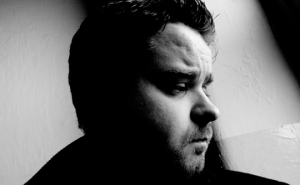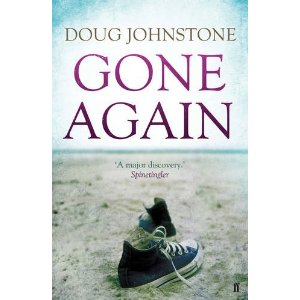Jay Stringer is among the noir new guard’s most exciting voices, an author whose hard and fast crime writing comes with real political and social depth. His second novel, Runaway Town, featuring half-Romani P.I and ex-cop Eoin Miller is out now and I strongly recommend you grab a copy if you haven’t yet. But with Runaway Town put to bed Jay’s mind is turning to the tricky issue of writing a trilogy. Here’s the man himself…
How the hell do you write a trilogy?
We all think we know. I mean, we’ve all seen Star Wars and Lord Of The Rings. Those of us with even better taste have all seen Back To The Future.
I thought there were simple rules. First one sets up a simple status quo (whatever you want, whatever you need…) and has a happy ending. Second one breaks the status quo (whatever you want, whatever you need…) and has a depressing ending. The third one then brings everyone back together, has some dancing teddy bears, somebody invents a Frisbee, and everyone lives happily ever after.
Once I knew I was writing a trilogy I sat and studied all of these films to get a sense of how the structure worked, and I realised pretty quickly that I’d gotten the rules all wrong. Star Wars: Episode Four ends on a happy note -if you count racial segregation and restoration of monarchy as ‘happy’- but The Fellowship Of The Ring ends with everyone split up and Sean Bean dead (again.) Back To The Future has a happy ending, but adds on a teaser of what’s to come. (“It’s not you, Marty, it’s your kids.” Marty should surely solve the problem by staying right where he is and raising them better.)
I also realised that The Empire Strikes Back is not a very good film. We all remember it as brilliant. Mostly because of one moment of Harrison Ford coolness, and also because it was the first time our childhood brains were split open by a downer ending. As a story, however, it just doesn’t stand up. It’s a chapter in a serial. It relies on Episode Four to be it’s first act, and you need to watch the next film to see any character arcs carried through. Incidentally, It also shows that Han Solo is a douche. He is paid his reward at the end of the first film, which is enough for him to cover his debt to Jabba, yet by the second film it’s clear he still never paid up. He’s a bill dodger.
The Two Towers takes this problem even further, as nothing of actual consequence happens in the film. You could watch the first film and then jump to the third film, and you wouldn’t know you’d missed more than a five-minute toilet break. It also shows up some structural problems that haunt the whole trilogy; the good guys keep winning. They win almost every battle in the three films. There are no stakes by the time you reach the final showdown of the trilogy, because we’re betting on the side that has never tasted canvas.
So what I realised was that the only real rules of ‘trilogy’ that I could depend on where that there were no rules.
The ending of Old Gold had been an accident. I’d had a very different finale in mind, and wrote the existing ending as just another chapter on route to that finale, but there was a sadness and heartbreak in the final line of that chapter that seemed like the only fitting end to the book, and I stopped typing there.
But if the first act in my trilogy had already raised the stakes of heartbreak and depression, what was I to do for the second story? Once again I had an ending in mind when I started, but I also didn’t want to write a story that only worked as a second act. There needed to be stakes. Things needed to happen. And I needed to tell a story with a beginning, middle and end.
That decision kicked all of the smugness out of me with regards to the “failings” of those films. It’s really hard. Everything that happens in Runaway Town is a consequence of actions in Old Gold. Each of the lies, punches and small betrayals from the first book are bearing down on my cast of characters by the time of the second one, and that has to be addressed. There are confrontations, bloodshed and revelations that need to be held off until book three, otherwise they would feel rushed.
Trying to find that balance between writing the middle act of a trilogy, and writing a story that had a self-contained arc, took my coffee obsession to a new level. The needle kept going to far one way or the other; I was either putting in too much or too little. And that continued even after I handed it in to the publisher, where my editor suggested that I move a couple of revelations forward from book three into Runaway Town.
The main trick was to go internal. It seems to me now –after handing in the manuscript for book 3- that the key to writing a trilogy is emotion. Fitting a story into the structure of a trilogy means we have to manipulate plot. We withhold things from the protagonist reader in contrived ways, and resort to tricks we wouldn’t dream of using if it was a single novel. There are always going to be plot twists and moments of physical drama that you want to hold off until the final act of the story, but book 2 is where you can wreck your characters emotionally.
I write crime and noir, so I deal in grief, deception and anger. Going internal meant ignoring the lies the writer tells to the reader, and focusing on the lies the characters tell themselves. Pulling the rug out from under. If your characters feel they have lines they won’t cross, or people they won’t become, or lies they won’t tell, then book 2 is the point when you make them face facts. Show them that their precious status quo (whatever you want, whatever you need…) is a myth.
I took great delight in making Eoin Miller face the lies he’s been telling himself. To make him relive the memories he chooses to ignore. We learn things about Eoin, Laura and Veronica that adds to the experience when re-reading Old Gold, but we also get the sense that the trilogy is not leading to a happy place in the next book.
Above all, I hope I succeeded in giving people a story with Runaway Town. It’s a book about being challenged. It’s about realising that difficult questions don’t have easy answers. A novel that can be read on it’s own, with a beginning, middle and end. Important things happen to my characters in this book, and I did it without any Harrison Ford coolness.
Runaway Town is available now


